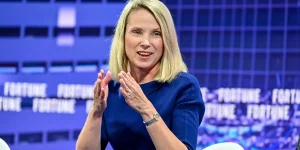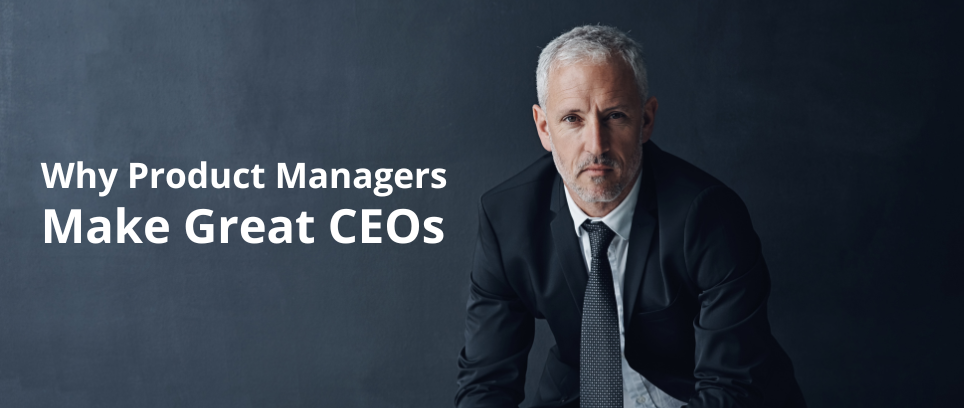A McKinsey report emphasized that product management is emerging as the new training ground for future CEOs. The belief has been gaining traction for years — “To become a great CEO, be a great Product Manager first!”
It’s not just a catchy phrase; it represents the deep connection between product managers and leadership roles. But is it really true? Can a Product Manager truly transition into a CEO? Let’s dive into how product management lays the foundation for top executive roles and explore the journey from product management to CEO.
The Product Management Pathway to the C-Suite
In recent years, professionals in product management have risen to C-suite positions at major global companies. The examples are plenty: Satya Nadella of Microsoft, Sundar Pichai of Google, Marissa Mayer of Yahoo, and Susan Wojcicki of YouTube all held product management roles before stepping into CEO positions at some of the world’s biggest tech giants.
The value of a product management program is clear: it offers invaluable experience in problem-solving, leadership, and empathy, all of which are crucial qualities for any CEO. The product management role often serves as the most crucial individual contributor position in a company and is a proven stepping stone to the C-suite.

Reasons Why Product Managers Make Great CEOs
Reason 1: Creating a Compelling Vision for the Company
The most critical responsibility of any CEO is to align the company around a unified vision. A CEO must help every employee “see the future” and inspire them to bring that future to life. The clearer the vision, the more effectively an organization can harness its collective creativity and intelligence. Product managers are excellent at crafting and communicating strategic visions to their teams. They bring their visions to life without micromanaging every detail — a skill that is essential for a future CEO.
Reason 2: Data-Driven Decision Making
A great Product Manager is highly data-driven, using client feedback and analytics to make informed decisions. CEOs, too, rely on data to shape strategies and measure progress. Peter Drucker famously said, “If you cannot measure it, you cannot improve it.” The emphasis on data management in product management programs equips professionals with the analytical skills that are indispensable for a CEO’s success.
Reason 3: Wearing Many Hats
A Product Manager often plays multiple roles across the product lifecycle, gaining exposure to various aspects of the business, such as marketing, business development, technology, and sales. This broad skillset makes product managers well-equipped for general management roles, including CEO. The ability to juggle diverse responsibilities is key to leadership, and it is this versatility that makes product managers great candidates for senior executive roles.
Reason 4: Customer-Centric Approach
In product management, the focus is always on understanding customer needs. Product managers use data, user feedback, and design thinking principles to ensure the product aligns with market demands. CEOs also share this customer-centric mindset, which is crucial for driving business growth. As product managers develop these customer-focused skills, they build a strong foundation for executive leadership.
Furthermore, the hands-on experience of solving challenges across various teams and functions helps product managers transition seamlessly into executive roles. The ability to empathize with others, solve complex problems, and communicate effectively are qualities that all great CEOs share.
Career Path: From Product Manager to CEO
The journey from product manager to CEO may not be immediate, but with the right skills and experience, it is entirely possible. Here’s a quick look at how product managers evolve into general managers and CEOs:
- Satya Nadella – From engineer and product management roles at Microsoft to becoming CEO.
- Shantanu Narayen – From Apple to the CEO of Adobe after leading product management teams.
- Marissa Mayer – From senior product management roles at Google to CEO of Yahoo.
5 Famous Product Managers Who Became CEOs
Product managers are often seen as the bridge between an organization’s vision and its execution, making key decisions that can determine the success of a product or service. While product managers do not typically hold direct authority over an entire company, they are responsible for driving decisions, strategy, and outcomes related to product success. This unique role prepares individuals for leadership positions by honing skills like vision-setting, problem-solving, data-driven decision-making, and cross-functional collaboration.
As the role of product management has evolved, many individuals who started their careers in product management have gone on to become highly successful CEOs. Let’s take a closer look at some of the most well-known product managers who ascended to the CEO position.
1. Sundar Pichai | CEO, Google and Alphabet

Sundar Pichai’s rise from a product manager to the CEO of one of the largest tech companies in the world is a testament to the valuable skills that product managers possess. Pichai’s journey began in India, where he earned his degree in Metallurgical Engineering before moving to the US to pursue an MBA at the prestigious Wharton School.
Initially joining Google in 2004, Pichai worked as the Product Manager for Google Toolbar, which helped expand the company’s search capabilities. His ability to transform complex technical features into user-friendly solutions caught the attention of senior leadership. He later took on product management responsibilities for Google Chrome, which became one of Google’s most successful products, overtaking Internet Explorer in global market share.
Through his tenure, Pichai demonstrated a keen understanding of user-centric design and execution, both of which are crucial in the role of a CEO. His experience as a product manager allowed him to understand the intricacies of managing teams, aligning cross-functional efforts, and navigating product roadmaps—all key components of his CEO role. In 2015, Pichai was appointed the CEO of Google and, later, the CEO of Alphabet Inc. (Google’s parent company), where he has continued to guide the company’s vast product ecosystem toward sustained success.
2. Susan Wojcicki | Former CEO, YouTube

Susan Wojcicki’s career at Google is a prime example of how product management can be a launchpad for executive leadership roles. Wojcicki’s journey began at Google in 1999 when she became their first marketing manager. Her early work at Google, including overseeing the development of Google’s advertising and analytics products, helped Google achieve the ad revenue dominance that sustains its business today.
In 2003, she transitioned into product management, overseeing AdSense, which became a massive success, helping Google monetize its platform. Wojcicki’s leadership in the product management space, particularly in user-focused innovation and scaling business products, made her an ideal candidate for higher-level leadership. Her knack for managing both user acquisition and business development became evident when she became the Senior Vice President of Advertising & Commerce at Google.
In 2014, Wojcicki was appointed CEO of YouTube, where she brought her extensive product management experience into play by making critical decisions that transformed YouTube into the dominant video platform it is today. Under her leadership, YouTube expanded its content offerings, integrated new monetization models, and grew exponentially. Her understanding of both user needs and data-driven decision-making helped YouTube remain a leader in the digital video space, exemplifying the path from product management to a CEO role.
3. Stewart Butterfield | Ex-CEO, Slack

Stemming from a background in philosophy, Stewart Butterfield’s transition to product management and eventually to CEO is an inspiring example of how diverse experiences can contribute to a product manager’s success. Butterfield’s first foray into product management came when he co-founded Flickr, which was later acquired by Yahoo in 2005.
After Flickr, Butterfield returned to the world of product development as the Senior Director of Product Management at Yahoo, where he gained valuable experience in scaling products for millions of users. He later co-founded Slack, initially a gaming platform, but pivoted to create a team collaboration tool when he and his team realized the need for better communication tools in the workplace.
As a product manager, Butterfield’s focus was always on creating an intuitive and user-friendly product that solved real-world business problems. His ability to see the bigger picture, build a compelling vision, and iterate on product ideas helped Slack rapidly gain traction and grow into one of the most popular workplace tools globally. Slack’s ultimate success and its acquisition by Salesforce in 2021 cemented Butterfield’s journey from product manager to CEO, highlighting how a deep understanding of user needs and product strategy can drive long-term success.
4. Marissa Mayer | Former CEO, Yahoo

Marissa Mayer’s career trajectory is one of the most widely recognized transitions from product management to a CEO role. Mayer joined Google in 1999 as its first female engineer and later moved into product management, where she played an instrumental role in developing Google’s flagship products, including Google Search, Gmail, and Google Maps.
Her ability to bridge the technical and business aspects of product management, along with her customer-centric approach, led to her rapid ascent within Google. As VP of Search Products, Mayer oversaw the product management for Google Search, one of the most vital products for the company, and significantly influenced its evolution into a user-centric platform.
In 2012, Mayer was appointed the CEO of Yahoo, where she tried to revitalize the company by focusing on product innovation, user experience, and acquisitions. Mayer’s approach emphasized improving Yahoo’s product portfolio to regain relevance in an increasingly competitive tech market. While her tenure at Yahoo had mixed results, Mayer’s journey from product manager to CEO demonstrated the significant impact that product management skills can have on executive leadership.
5. Indra Nooyi | Former CEO, PepsiCo

Indra Nooyi’s transition from product management to one of the world’s most influential CEOs is a remarkable example of leadership in general management. Nooyi earned her MBA from Yale School of Management and began her career at Johnson & Johnson in Mumbai, where she worked as a product manager. She later joined PepsiCo in 1994, where she would go on to hold various senior positions.
At PepsiCo, Nooyi focused on strategic decision-making and was pivotal in transforming PepsiCo’s product portfolio to include healthier options, aligning with changing consumer preferences. Her role in product innovation and market expansion helped PepsiCo achieve remarkable growth during her tenure. As CEO, Nooyi’s product management background allowed her to make data-driven decisions and create a vision for PepsiCo’s future, including key acquisitions and a shift toward sustainability.
Nooyi’s ability to leverage her product management expertise to lead PepsiCo through times of significant industry transformation is an excellent example of how a strong foundation in product management can propel an individual to the highest levels of corporate leadership.
These five examples highlight how a career in product management can lay a solid foundation for ascending to the CEO position. Whether managing products at a tech giant like Google or driving transformation at a global brand like PepsiCo, product managers have the skills and mindset required to make strategic decisions, lead teams, and drive business success.
As seen with these famous CEOs, the transition from product management to the C-suite is not only possible but is increasingly becoming a preferred pathway to leadership.
Conclusion: Product Managers Are Tomorrow’s Leaders
In conclusion, product management provides an excellent foundation for leadership. The core skills of a product manager — vision creation, data-driven decision making, versatility, and a customer-centric approach — directly translate to CEO responsibilities. While not every product manager becomes a CEO, the career progression of many product managers has shown that this path is very much a reality.
If you aspire to become a CEO, starting with a career in product management can set you on the right track. Understanding the product lifecycle, collaborating across teams, and solving complex challenges will equip you with the leadership skills needed for executive management roles.
How Product Management Programs Prepare You for Leadership
Product managers possess many of the core skills needed to thrive in top executive roles. These professionals are often responsible for overseeing cross-functional teams, building and communicating strategic plans, and making critical decisions — all of which are crucial for C-suite positions. With the right product management program, aspiring executives can gain the knowledge and hands-on experience required to propel their careers.
 Pin
PinExplore E&ICT Academy IIT Guwahati’s Executive Program in Data Driven Product Management And Work On 3 Live Industry Projects in partnership with Accredian to learn from top-notch experts, work on live industry projects, and accelerate your career in product management. Don’t miss this chance to gain invaluable skills that can lead to an executive leadership role!






